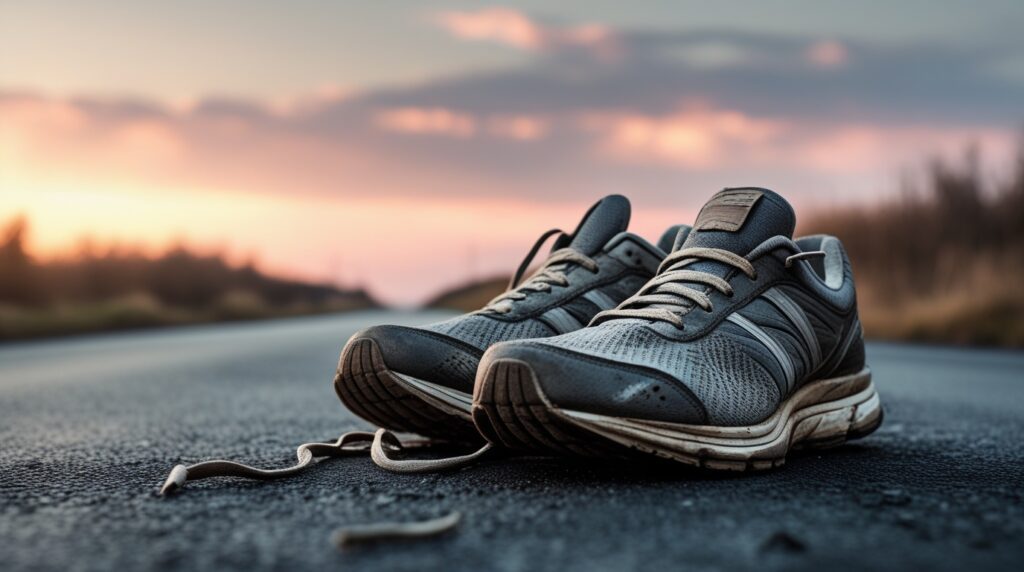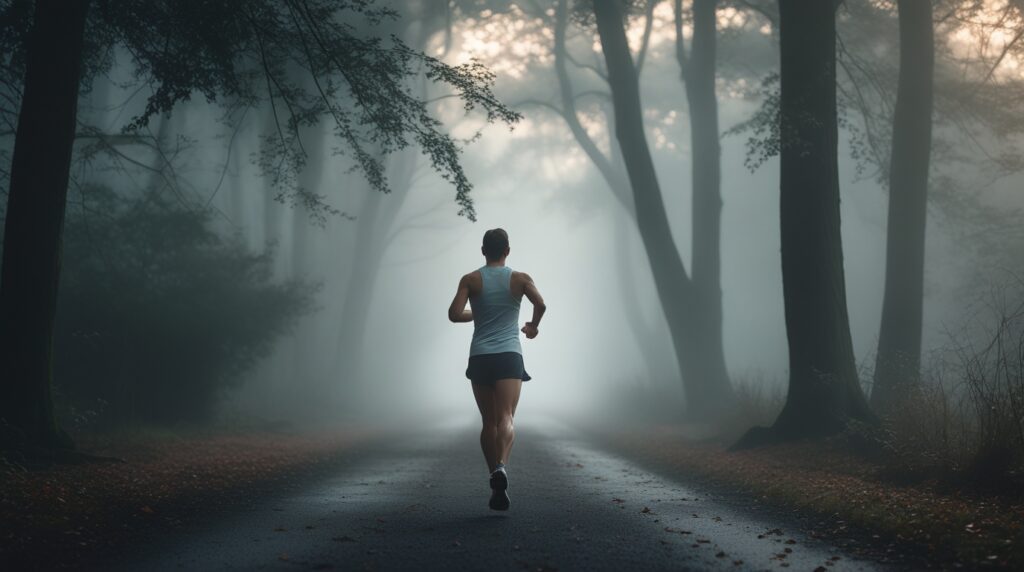This blog contains affiliate links. If you purchase through these links, I may earn a small commission at no extra cost to you. This helps support my work in sharing my recovery journey. Thank you for your support!
The Unexpected Start – How I Stumbled into Running
I never imagined myself running. Picture a guy in his late 40s, fresh from rehab, lugging two decades of heavy drinking, stepping into a gym like a stranger. That was me. Lifting weights became my sanctuary—I’d feel the burn and think, This is control. It worked, until it didn’t.
Then I met a pro runner at the gym—lean, wiry, eyes alight with quiet fire. Between sets, he spoke of running like it was holy. “It’s freedom,” he said, voice steady, offering me a secret. After years of alcohol numbing me, freedom struck like lightning. I’d been trapped so long, I barely believed I deserved it. But I craved it.
One crisp morning, I grabbed old sneakers—worn but functional—and stepped out. My first run was a mess: 6-7 km/h, 20-25 minutes, lungs screaming. I expected to hate it, to limp home beaten. Instead, sweat stung my eyes, my ragged breath found a beat, and clarity cut through addiction’s haze. My legs groaned, but my mind sparked awake, shedding rust I didn’t know I could lose.

It wasn’t graceful—kids on bikes probably laughed as I shuffled past. I didn’t care. I felt free—not the hollow kind from bottles, but real, gritty, mine. Gasping afterward, hands on knees, I grinned like a fool. What began as a whim hooked me deep. Each step proved I could outrun my past. Messy, unglamorous, it was a spark that kept burning.
The Connection Between Running & Recovery
Running became my recovery’s backbone. After decades of addiction, my mind was a war zone—cravings striking like snipers, regrets stacking up like rubble, self-doubt roaring I’d never escape the pit I’d dug. Staying sober felt like climbing a mountain blindfolded, no map in sight. Then running slipped in, quiet but firm, and started taming the storm.
Each run hushed the chaos. The first steps dragged—legs leaden, mind muttering—but a kilometer in, things shifted. Cravings dimmed, guilt loosened its grip. Step by step, running delivered peace booze never could. Quitting drinking was a brutal brawl; running felt instinctive. Gym-built stamina kicked in—my body knew the drill—so that first run slotted in like a missing piece.

Science backs it: the Mayo Clinic says exercise floods your brain with endorphins, lifting mood, easing stress. Running 3-4 times a week became my natural high, swapping whiskey’s buzz for something real. Sleep, once a nightmare-laced wrestle, turned restful—I’d hit the pillow and wake renewed. Confidence grew, steady and subtle; tough days lost their sting. It was free therapy, just me and the road.
Beyond science, running rewired me. The gym demanded structure—reps, weights—but running? Lace up and go. That ease kept me hooked. When life weighed heavy—stress, triggers—it waited, a lifeline I didn’t overthink. It bridged addiction’s ruins to solid ground—not a cure, but a weapon. Mid-run, alone with my breath, I’d glimpse who I was becoming: stronger, clearer, free.
Why Many Struggle with Running (and How I Found My Way)
I get why people hate running—it’s rough at first. They call it boring, a slog, pure torture. I did too. My legs burned, lungs rasped, and five minutes in, I’d wonder, Why bother? Most chase speed or distance, some glittering goal, then crash when it slips away. They sprint toward a moving finish line, stumble, and quit. I nearly did. But I found a different way: I stopped running for numbers and ran for the feel.
That changed everything. My pace dropped to 6-7 km/h—a speed “real” runners might scoff at. That didn’t bother me. Tuning into the small stuff—breath puffing in cold air, gravel crunching, the world blurring past—kept me grounded. It wasn’t about speed—it was about being present. The American Psychological Association says exercise cuts stress when you enjoy it, not dread it. That hit home. I ditched the stopwatch, the pressure, and let my mind drift—wind in the leaves, air nipping my face. “Boring” turned alive, even fun.
Running became about moving forward, not winning. Some days, a kilometer broke me—legs shaky, chest tight. Others, I’d push past what I thought I could, stunned by my own grit. Every time, I’d end lighter—sweat rinsing something heavy away, mind eased. That shift from “I hate this” to “I’ve got this” crept up. It wasn’t about being fastest or fittest—just showing up, step by step, finding myself in the rhythm.
My Running Routine & What Fuels Me to Keep Going
My routine’s simple: 3-4 runs a week, 30 minutes each, at 7-8 km/h. No marathons or medals—just a steady hum grounding me. Consistency, not intensity, drives it. After a relapse flattened me, endurance vanished—15 minutes felt like climbing a cliff, each step begging me to stop. But I kept going, shuffling out, cursing the wind, clawing back slowly. Now, it’s my morning anchor. Work drags me down—deadlines, emails, grind—but runs reset me. Fresh air floods my lungs, quiet streets open up, and I’m lifted, ready for anything.
The payoff’s unreal—that post-run glow. I’d stumble back home, cheeks flushed, legs buzzing, and feel this sharpness, this lightness, like I’d already won the day before it really started. It doubles as meditation—my mind, usually a tangle of worries, settles into something calm, clear. Stress doesn’t just fade; it melts away, puddle by puddle. Even on mornings when the bed’s calling louder than ever, that after-feeling yanks me out. It’s a pull stronger than any excuse I could muster—a quiet promise that I’ll feel better for it, and I always do.
And the best part? It’s free. Gym memberships pile up, fees stacking higher every year, but running doesn’t care about my wallet. When money was tight—those lean months when every dollar felt stretched thin—running stayed with me, a companion that didn’t judge or demand. All it asks is effort, a little grit, and in return, it hands me everything: proof I can count on myself, no matter how rough things get. That’s the fuel—the knowing that this is mine, always there, steady as the sunrise.
Lessons I’ve Learned from Running
Running’s been a teacher, patient but relentless. First lesson: progress isn’t a race—it’s a slow, stubborn crawl. There were days when a single kilometre felt like a war, my legs howling for mercy, my breath a jagged mess. I’d want to hurl my shoes into a ditch and call it quits. But then I’d hit a tiny win—five extra minutes without stopping, a little less gasping—and I’d cling to it. Those scraps of victory taught me to wait, to breathe through the hard stuff. That patience spills over now, softening the frantic edge I used to chase with a bottle in hand. The American Psychological Association says exercise builds resilience—I felt it take root.
Then there’s the clarity. It sneaks up mid-run, when the world’s a blur and it’s just me and the road. Problems that loomed like giants—work stress, old ghosts—shrink down to size. Ideas spark out of nowhere, sharp and bright. It’s like my brain hits a reset button, cutting through the static. Endurance grows, too—not just in my legs, but in my bones. A brutal run makes life’s punches land softer; I’m not bulletproof, but I’m tougher, steadier. Each mile drives it deeper, rooting me when everything else feels like quicksand.
Discipline hit hardest. Early runs built routine—addiction never allowed that. I’d stumble out at dawn, grumbling, half-awake. Some days, I’d barely clear a block, doubting it all. But I showed up—not for glory, just grit. The Mayo Clinic links exercise to focus—I feel it: days align, choices firm up. Running reshaped me, stride by stride.
The Takeaway – Why You Should Give Running a Chance
Running’s not everyone’s thing—I won’t pretend it is. But movement? That’s a healer, plain and simple. If running spooks you—maybe the huffing, the sweat, the sheer effort—just ease in. Start slow, mindful, no pressure to perform. Shuffle down the street, feel your feet tap the ground, let the rest fall away. It’s not about speed or distance; it’s about showing up, even if you’re inching along. I’m proof it works: steady runs pulled me from addiction’s swamp to something solid, something alive.
If running doesn’t stick, no sweat. Find what moves you—walking, dancing, hauling weights, whatever clicks. The magic’s in the habit, not the how.

For me, running was the ember that caught. It’s free, raw, unpolished—a lifeline anyone can snatch up. Try it gentle—five minutes, ten, whatever feels right. Let it unfold, see where it takes you. You might stumble into your own rhythm, your own story, waiting in the echo of your steps. That’s where I found mine, and it’s still carrying me forward.
Conclusion
Running dragged me out of addiction’s undertow and dropped me into renewal—not with fanfare, but with quiet, stubborn steps. It’s never been about speed or glory; it’s about sticking with it, stumble after stumble. My road was jagged—relapses, doubts, days I nearly broke—but progress outshone perfection every time. A fall isn’t the end; it’s just a bend in the path. I wrote about my toughest moments here, where addiction nearly broke me but recovery reshaped my path.
Have you ever tried it? Not the pounding, all-out kind—just slow, steady, yours? Lace up and test it—you might catch yourself off guard. Or chase something else that stirs you. Movement’s the thread; how you weave it is yours to shape. What’s your story? Where’s it taking you? If you’re just starting, grab a pair of comfortable running shoes. The right pair makes all the difference—these are my favorites Running Shoes.
It’s not polished or grand—just real. Years of haze dissolved, stride by stride. I’m no mentor, just a guy who ran and found more than he bargained for. Tell me yours—I’d love to hear where your steps lead.